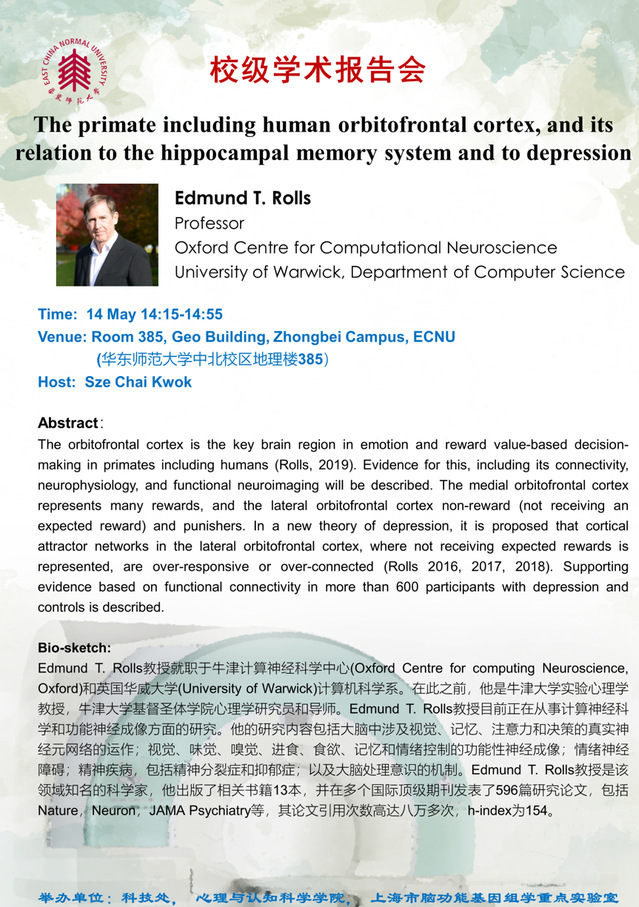讲座题目:The primate including human orbitofrontal cortex, and its relation to the hippocampal memory system and to depression 主讲人:Edmund T. Rolls 教授 主持人:郭思齐 副教授 开始时间:2019-05-14 14:15:00 讲座地址:中北校区地理楼385 主办单位:心理与认知科学学院、上海市脑功能基因组学重点实验室
报告人简介: Edmund T. Rolls教授就职于牛津计算神经科学中心(Oxford Centre for computing Neuroscience, Oxford)和英国华威大学(University of Warwick)计算机科学系。在此之前,他是牛津大学实验心理学教授,牛津大学基督圣体学院心理学研究员和导师。Edmund T. Rolls教授目前正在从事计算神经科学和功能神经成像方面的研究。他的研究内容包括大脑中涉及视觉、记忆、注意力和决策的真实神经元网络的运作;视觉、味觉、嗅觉、进食、食欲、记忆和情绪控制的功能性神经成像;情绪神经障碍;精神疾病,包括精神分裂症和抑郁症;以及大脑处理意识的机制。Edmund T. Rolls教授是该领域知名的科学家,他出版了相关书籍13本,并在多个国际顶级期刊发表了596篇研究论文,包括Nature,Neuron,JAMA Psychiatry等,其论文引用次数高达八万多次,h-index为154。 报告内容: The orbitofrontal cortex is the key brain region in emotion and reward value-based decision-making in primates including humans (Rolls, 2019). Evidence for this, including its connectivity, neurophysiology, and functional neuroimaging will be described. The medial orbitofrontal cortex represents many rewards, and the lateral orbitofrontal cortex non-reward (not receiving an expected reward) and punishers. In a new theory of depression, it is proposed that cortical attractor networks in the lateral orbitofrontal cortex, where not receiving expected rewards is represented, are over-responsive or over-connected (Rolls 2016, 2017, 2018). Supporting evidence based on functional connectivity in more than 600 participants with depression and controls is described. Functional connectivity (measured by correlations with resting-state fMRI) of the lateral orbitofrontal cortex (OFC) was increased in depression with the temporal lobe cortex (which provides inputs to the OFC); the angular gyrus (involved in language and providing a long loop for rumination); and the precuneus and posterior cingulate cortex (involved in the sense of self and low self-esteem in depression). The lateral OFC non-reward system has increased functional connectivity with the parahippocampal gyrus and medial temporal lobe memory system, which is believed to increase sad memories in depression. The medial OFC has reduced functional connectivity with the medial temporal lobe memory system in depression, contributing it is believed to fewer happy memories in depression. In an activation study with 1140 participants, it was found that those at high risk of depression have greater activation in the lateral OFC to not winning in the monetary incentive delay task, and that the medial orbitofrontal cortex is relatively insensitive to differences in reward value. This evidence that the non-reward lateral OFC is over-connected and over-responsive to non-reward in depression, and the medial OFC is under-connected and under-sensitive to reward in depression, is leading to new treatments for depression.
|


